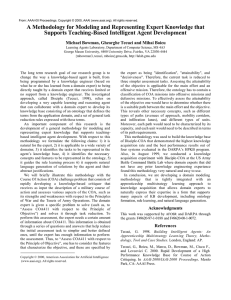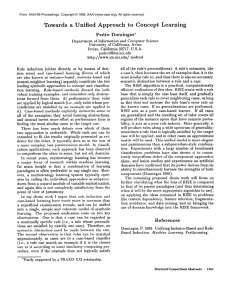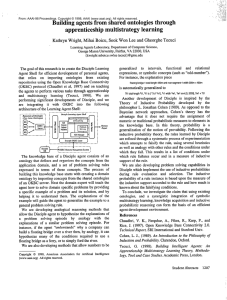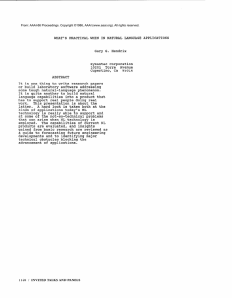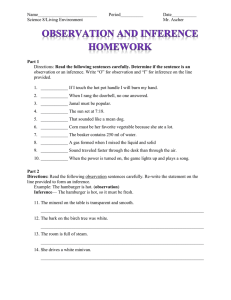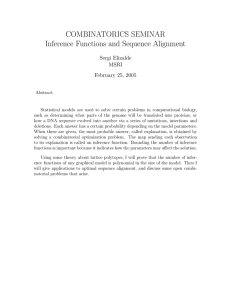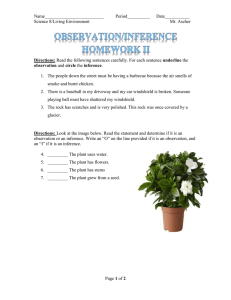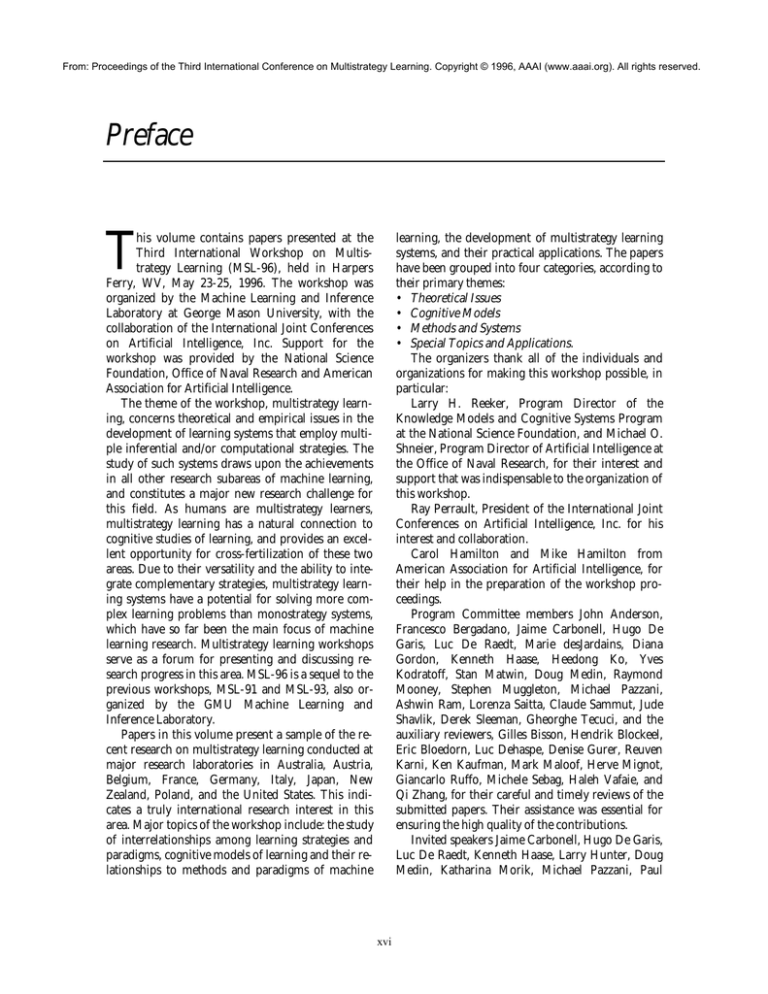
From: Proceedings of the Third International Conference on Multistrategy Learning. Copyright © 1996, AAAI (www.aaai.org). All rights reserved.
Preface
T
his volume contains papers presented at the
Third International Workshop on Multistrategy Learning (MSL-96), held in Harpers
Ferry, WV, May 23-25, 1996. The workshop was
organized by the Machine Learning and Inference
Laboratory at George Mason University, with the
collaboration of the International Joint Conferences
on Artificial Intelligence, Inc. Support for the
workshop was provided by the National Science
Foundation, Office of Naval Research and American
Association for Artificial Intelligence.
The theme of the workshop, multistrategy learning, concerns theoretical and empirical issues in the
development of learning systems that employ multiple inferential and/or computational strategies. The
study of such systems draws upon the achievements
in all other research subareas of machine learning,
and constitutes a major new research challenge for
this field. As humans are multistrategy learners,
multistrategy learning has a natural connection to
cognitive studies of learning, and provides an excellent opportunity for cross-fertilization of these two
areas. Due to their versatility and the ability to integrate complementary strategies, multistrategy learning systems have a potential for solving more complex learning problems than monostrategy systems,
which have so far been the main focus of machine
learning research. Multistrategy learning workshops
serve as a forum for presenting and discussing research progress in this area. MSL-96 is a sequel to the
previous workshops, MSL-91 and MSL-93, also organized by the GMU Machine Learning and
Inference Laboratory.
Papers in this volume present a sample of the recent research on multistrategy learning conducted at
major research laboratories in Australia, Austria,
Belgium, France, Germany, Italy, Japan, New
Zealand, Poland, and the United States. This indicates a truly international research interest in this
area. Major topics of the workshop include: the study
of interrelationships among learning strategies and
paradigms, cognitive models of learning and their relationships to methods and paradigms of machine
learning, the development of multistrategy learning
systems, and their practical applications. The papers
have been grouped into four categories, according to
their primary themes:
• Theoretical Issues
• Cognitive Models
• Methods and Systems
• Special Topics and Applications.
The organizers thank all of the individuals and
organizations for making this workshop possible, in
particular:
Larry H. Reeker, Program Director of the
Knowledge Models and Cognitive Systems Program
at the National Science Foundation, and Michael O.
Shneier, Program Director of Artificial Intelligence at
the Office of Naval Research, for their interest and
support that was indispensable to the organization of
this workshop.
Ray Perrault, President of the International Joint
Conferences on Artificial Intelligence, Inc. for his
interest and collaboration.
Carol Hamilton and Mike Hamilton from
American Association for Artificial Intelligence, for
their help in the preparation of the workshop proceedings.
Program Committee members John Anderson,
Francesco Bergadano, Jaime Carbonell, Hugo De
Garis, Luc De Raedt, Marie desJardains, Diana
Gordon, Kenneth Haase, Heedong Ko, Yves
Kodratoff, Stan Matwin, Doug Medin, Raymond
Mooney, Stephen Muggleton, Michael Pazzani,
Ashwin Ram, Lorenza Saitta, Claude Sammut, Jude
Shavlik, Derek Sleeman, Gheorghe Tecuci, and the
auxiliary reviewers, Gilles Bisson, Hendrik Blockeel,
Eric Bloedorn, Luc Dehaspe, Denise Gurer, Reuven
Karni, Ken Kaufman, Mark Maloof, Herve Mignot,
Giancarlo Ruffo, Michele Sebag, Haleh Vafaie, and
Qi Zhang, for their careful and timely reviews of the
submitted papers. Their assistance was essential for
ensuring the high quality of the contributions.
Invited speakers Jaime Carbonell, Hugo De Garis,
Luc De Raedt, Kenneth Haase, Larry Hunter, Doug
Medin, Katharina Morik, Michael Pazzani, Paul
xvi
From: Proceedings of the Third International Conference on Multistrategy Learning. Copyright © 1996, AAAI (www.aaai.org). All rights reserved.
Rosenbloom, Lorenza Saitta, Benjamin Smith, and
Claude Sammut.
Abhay Kasera, Grant Manager at the GMU
Machine Learning and Inference Laboratory, and
Local Arrangements Chair, who so diligently directed
and executed many organizational aspects of the
workshop.
Eric Bloedorn, Ken Kaufman, Mark Maloof,
Haleh Vafaie and Qi Zhang, Graduate Research
Assistants in the GMU Machine Learning and
Inference Laboratory, for skillfully handling many
organizational chores. They were a great and reliable
team, whose help cannot be overstated.
Yves Kodratoff, Stan Matwin and Gheorghe
Tecuci for their contribution to the initiation and
development of the Multistrategy Learning
Workshop series.
Last but not least, our deep and special gratitude
goes to the Defense Advanced Research Projects
Agency, the National Science Foundation and the
Office Naval Research for supporting research in the
Machine Learning and Inference Laboratory. Their
continuous support over the years has enabled us to
develop a critical mass of researchers, and to build at
George Mason University a research program in machine learning and inference. The MSL series of
workshops is one of its byproducts.
We present these Proceedings to the reader with
the hope that they will contribute in a meaningful
manner to the dissemination of ideas and further
progress in this highly challenging and important
research direction.
– Ryszard S. Michalski
Janusz Wnek
xii

